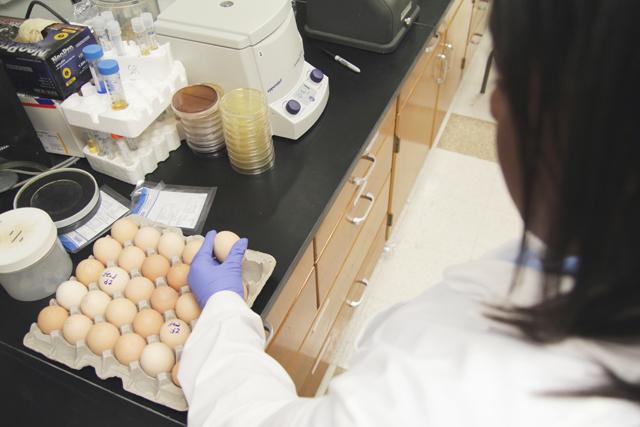Salmonella bacteria are everywhere, according to Sam Pardue, head of the poultry science department.
Symptoms of salmonella enteritis include diarrhea, stomach cramps and vomiting. This illness can come from eating under-cooked eggs, as the recent outbreak demonstrated.
“Salmonella enteritis, is a bacterium that is associated with the ovary of infected hens. They are problematic because the bacteria are “inside” the egg. So sanitizing the shell has no impact on Salmonella enteritis,” Pardue said.
There has been a national wide recall of around 380 million eggs as hundreds of people around the country have fallen ill. The reason has been linked to the bacteria Salmonella present in eggs produced by some of the facilities owned by an Iowa company, Wright County Egg.
It has been the largest outbreak associated with eggs in a long time. The outbreak started off in May when many states saw an increase of a common type of bacterial disease called salmonella enteritis.
The tainted eggs were distributed under the brand names Dutch Farms, Kemps, James Farms, Lucerne, Albertson, Mountain Dairy, Ralph’s, Boomsma’s, Sunshine, Hillandale, Trafficanda, Farm Fresh, Shoreland, Lund, Glenview and Pacific Coast. Consumers have been told to return the eggs to the stores where they had bought them from.
Salmonella bacteria can get into chickens through chicken feed and unhygienic conditions in the barn. The feed could have been contaminated in a number of ways, including by birds, rodents and people’s shoes or boots, officials said.
Pardue said he advised the students not to eat raw eggs or products containing raw or under cooked eggs. He said
“To my knowledge, eggs produced in North Carolina are free of the salmonella enteritis bacteria,” Pardue said.
Some students, such as Marcello Dalmagro, a graduate student in poultry science, said the outbreak won’t prevent them from purchasing eggs.
”I am not scared of buying eggs but I have heard a few people telling they won’t buy eggs,” Dalmargo said.
Doug Smith, associate professor in the department of poultry science, said students should avoid all possibilities of cross contamination.
“Students should avoid cross contamination, that is, when one cooks scrambled eggs, use one spoon for dealing with raw eggs, and another spoon when stirring the cooked eggs. Even id eggs have salmonella, if you cook them well, then there is no problem,” Smith said.
Pardue said as a result of the result outbreak, the short term consumption of eggs would decrease.
Pardue said, “Salmonella are ubiquitous. There are found everywhere in the environment. Outbreaks have been associated with many food products: pistachios, cantaloupe, alfalfa sprouts, jalapeno peppers, peanut butter, tomato, and so many other foods.”
According to Dalmagro, Salmonella outbreaks happen often but U.S. Department of Agriculture does not detect it. As the recent outbreak has been highly published in the media, people are aware of it.
Dalmagro said that the people can fall sick by eating under-cooked meat.
“Most of the meat and meat products have salmonella in them, so one has to cook the meat well before consuming it,” Dalmagro said.
Campell Stubbs, a senior in bioprocessing science, said the salmonella outbreak in eggs did not bother him.
“I have never liked eggs. I love beef, I eat it well-cooked though. But in some of the better restaurants, I like to eat them medium rare. I have stopped eating pork though, after seeing a Youtube video. Pork can be poisonous if it is not cooked exactly right,” Stubbs said.








